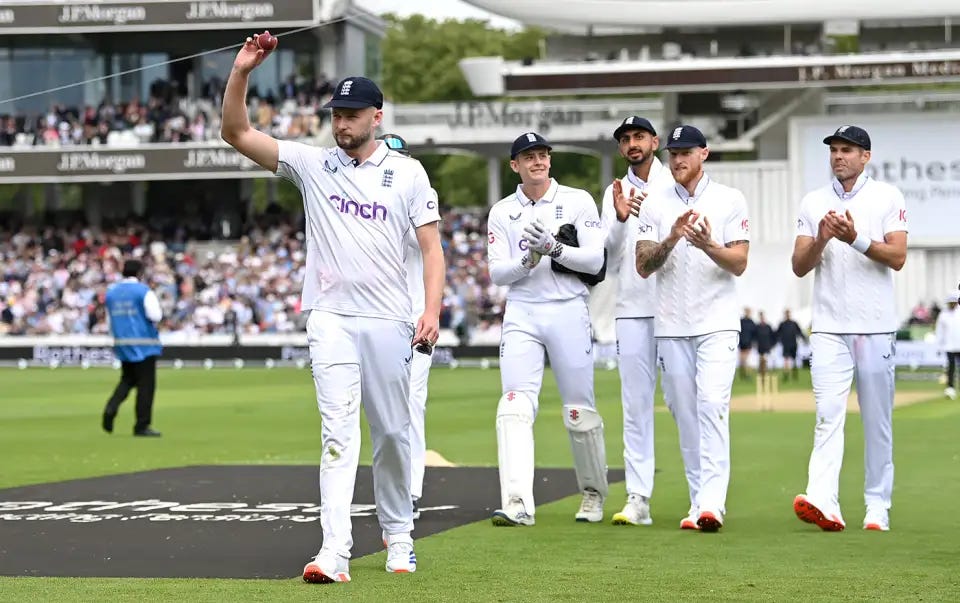Selection: England's Rob Key still ahead of the curve
Key rode into the job on a wave of fresh optimism and hope. The hope soon transcended to success, and the optimism moved to belief in what seemed like days.
It’s fine to leave out Jonny Bairstow. He’s not been playing great, and more importantly, he doesn’t look like he’s doing much realigning. He’s 34 years old, which isn’t ancient, but old enough not to dally.
Jimmy Anderson will play on like Joe Biden is, maintaining his unhealthy love of office. An end plan had to be issued; Jimmy likely wanted that. Well done—the Democrats missed their window.
Ben Foakes—it looks like you’re being unkind. Yes, he’s an old-school locker room kinda guy, but he’s one-dimensional, and unfortunately for him, he sits in the ‘easy-to-drop category.
Ollie Robinson—forget it. I think you have.
Jamie Smith looks good, and some say he's a generational talent—oh dear, we know what can come next; he plays for England A (Surrey CCC) and fits the Bazball mandate—that's right. So, pick him, and you did.
Jack Leach: he's an author's favourite. Injuries have been uncharitable to the green-fingered twirler. Leach did the hard yards in the Giles/Silverwood/Root epoch and at the start of Bazball when mid-off and mid-ons were rarely allowed. Now, he must contemplate a TV career as a gardening presenter. I'm sure the ECB's benevolence will help.
This passage was part of my mental note to Rob Key, head/lead/chief selector of England men's cricket, before the Lord's Test with the West Indies.
SpeakingNick is supported by your subscriptions. I thank you sincerely and if you are still a free subscriber, please, if you can, consider subscribing. Thank you.
Rob Key was appointed the Managing Director of England Men's Cricket on April 17, 2022, taking over from Ashley Giles.
Australian pundit Kerry O'Keeffe described Giles as the ultimate committee person. He believed he would break all records for committees sat on. Clearly a piss-taker, O'Keeffe thrives on baiting the English. Giles was always an easy target.
But this was where English cricket had descended. It was back in the 1970s and 1980s when the gatekeepers were as distantly removed from the men on the ground as they could possibly be.
Key rode into the job on a wave of fresh optimism and hope. The hope soon transcended to success, and the optimism moved to belief in what seemed like days. A new era of self-gratulation dispelled all the negativity that preceded Key's appointment. Of course, a change in captaincy and a move to a more positive coaching mindset helped his cause.
That said, Key's initial impact was telling.
In June 2022, England defeated New Zealand in an absorbing home Test series. In July, they beat India in a rescheduled Test. Later that summer, they brushed South Africa aside. Then, in December, England whitewashed Pakistan 3-0 in an away Test series.
Oh, in November 2022, they also added the T20 World Cup under Jos Buttler's captaincy.
Arguing against Key's impact in his first nine months is hard.
An eagerly awaited home Ashes series framed 2023. Australia will benchmark your shift in strategy more diligently than any other team in world cricket. The series contained many fascinating sub-plots:
The most compelling was the contrasting cricket philosophies of England's dynamic 'Bazball' strategy, implemented by Ben Stokes and Brendon McCullum, against Australia's traditional and systematic approach. On reflection, neither superseded the other.
The 'human headline, David Warner, would be playing his last series in England, where his record has fallen well short of his career numbers. On the other side of the corridor, Stuart Broad was playing his last International series.
Ultimately a tied series spoke more to the development of England's cricket than Australia's failure to close out the series.
The media and the fans play a part, but it's frustrating to read and hear the BS about a shift in selection. No one needs a lecture on this.
Really, it's not just on a whim: Smith instead of Bairstow or Foakes. Key and his cohorts have a plethora of information and facts on why and when to move in a different direction. I also support the use of a subjective element in selection. If this wasn't there, anyone might do the job. Feelings and hunches have to be considered and acted upon. If Smith for either was this, no worries.
Rob Key has house money to play with here.
It's true, Ben Foakes is currently the first-choice keeper at Surrey. So, yes, Jamie Smith is a gamble. A gamble Rob Key believes is justified. Perhaps Surrey have it arse about face.
Here's some of what Key said to justify him doing his job:
"We've been watching Jamie Smith for some time now. You see players who are rare talents, and he looks like that. There's a lot made of us just wanting someone to go out there and play shots; this is not the case. We want someone who can not only up the ante when they're batting with the tail but soak up pressure when they need to, and we feel Jamie Smith can do that."
And, on Bairstow, "Jonny needs to get back to where he was a couple of years ago. Generally, his form in all formats has been going in the wrong direction. You want him to get back to what he was when Brendon and Ben started out, "Key said.
"It's an arduous task, being a keeper as well, so you want someone who can back up series after series, and we weren't convinced Jonny would be able to do that, especially at the stage of career he's at," he added.
So, Bairstow's too old. This is it. Why not just say Jonny's numbers don't warrant him a place, and we feel it's time to give someone else an opportunity against below-par opposition—the opposition bit isn't necessary?
Legendary investor Charlie Munger is described as the best 60-second thinker ever. At first glance, this sounds impulsive. But perhaps we can think too deeply: " Let's play Jamie Smith and manage the fallout." Instincts should be encouraged.
Michael Sholly is a well-known cricket identity in Melbourne. Sholl has filled every leadership position at the Melbourne Cricket Club; he is living proof that you can be both a polarising presence and universally respected. During my time at Melbourne there wasn't one decision made without the best interests of the team front of mind. He cared less about the club than the team.
Rob Key's tenure has seen a positive shift in England's cricketing fortunes, with a primary focus on aggressive play across all three formats. Strategic selection criteria has supported this by blending experienced and younger players.
Retiring players who leave too big a void put a team in the worst possible position. Key and his colleagues must balance this evolutionary cycle.
I wish for Key and his like to enjoy room to exercise their judgements without undue influence from the periphery.
Appendix:
England won the Lord's Test by an innings and 114 runs.
Gus Atkinson—one of Anderson's underlings—returned extraordinary figures on debut: 7-45 in the first innings and 5-61 in the second. Jamie Smith made 70 (119 balls). His entry point being 5 for 254, and his exit—last man out—10 for 371. Both players vindicate selection.
I don't have a report on Jack Leach, but I'm guessing that in between watching the cricket from his favourite armchair, he would have been meticulously tending to his Taunton garden





